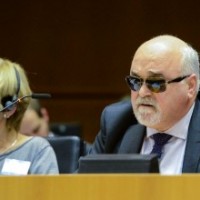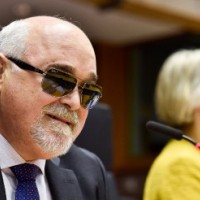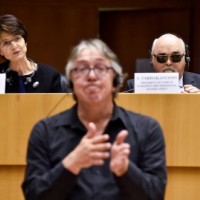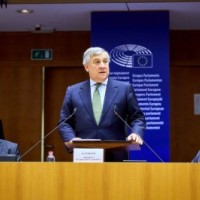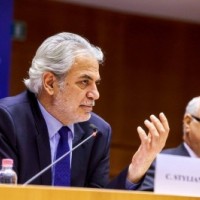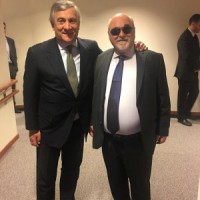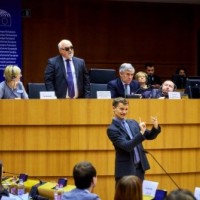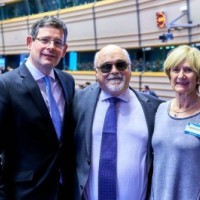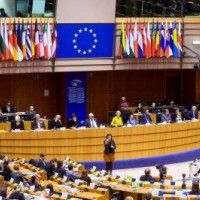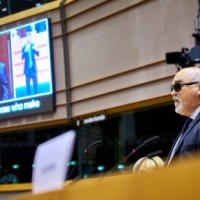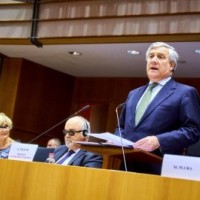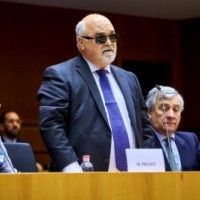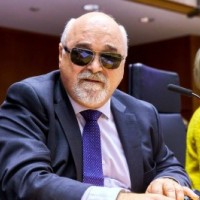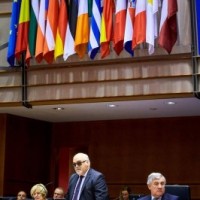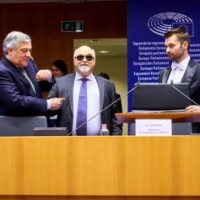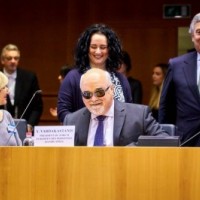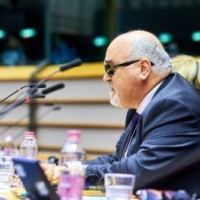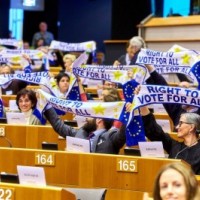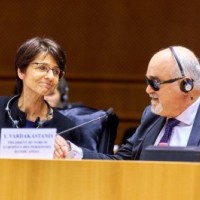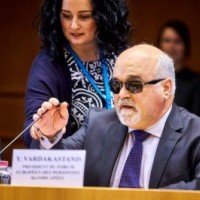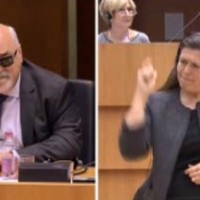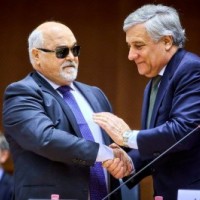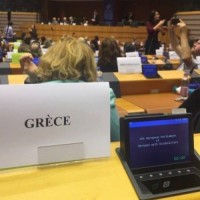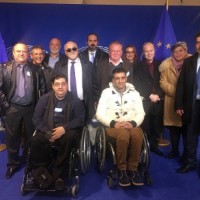
Με ένταση, με παλμό, με διεκδικητική διάθεση, πάνω από 600 άτομα με αναπηρία από όλες τις χώρες τις ΕΕ συγκεντρώθηκαν σήμερα 6 Δεκεμβρίου στις Βρυξέλλες, και σχημάτισαν το 4ο Ευρωκοινοβούλιο των ατόμων με αναπηρία.
Ο Πρόεδρος του Ευρωκοινοβουλίου Αντόνιο Ταγιάνι και ο Πρόεδρος της ΕΣΑμεΑ και του EDF Ιωάννης Βαρδακαστάνης κήρυξαν την έναρξη της συνεδρίασης του Ευρωκοινοβουλίου με κεντρικό θέμα συζήτησης το δικαίωμα του εκλέγειν και εκλέγεσθαι, που για πολλά άτομα με αναπηρία είναι απαγορευμένο και αποτελεί αίτημα και διεκδίκηση. Ομόφωνα υπερψηφίστηκε το Μανιφέστο για τις Ευρωεκλογές 2019, με την υπερψήφιση του οποίου ο κ. Βαρδακαστάνης δήλωσε σε πανηγυρικό τόνο:
Τώρα πρέπει να το προωθήσουμε, τώρα πρέπει να στείλουμε περισσότερα άτομα με αναπηρία στο επόμενο Ευρωκοινοβούλιο. Έχουμε τα νούμερα! Έχουμε το θάρρος!
Κηρύττοντας την έναρξη του 4ου Ευρωκοινοβουλίου ο κ. Βαρδακαστάνης τόνισε μεταξύ άλλων τα εξής:
Το δικαίωμα του εκλέγειν και του εκλέγεσθαι, η συμμετοχή στην πολιτική και στη δημόσια ζωή βρίσκονται στο επίκεντρο της δημοκρατίας. Η συμμετοχή των ατόμων με αναπηρία στην κοινωνία δεν μπορεί να είναι πλήρης και αποτελεσματική, αν δεν περιλαμβάνονται σωστά στην πολιτική ζωή όπως οποιοσδήποτε άλλος πολίτης της ΕΕ.
Ωστόσο, οι εκατοντάδες χιλιάδες των ατόμων με αναπηρία στερούνται του δικαιώματος του εκλέγειν και εκλέγεσθαι και δεν έχουν ίσες ευκαιρίες να εισέλθουν στην πολιτική.
Γνωρίζουμε τη δέσμευση του Προέδρου του Ευρωκοινοβουλίου στο ζήτημα, το οποίο θα θέλαμε να είμαστε ψηλά στην ατζέντα του ΕΚ. Θα θέλαμε το ΕΚ να απευθύνει ισχυρές συστάσεις στα κράτη μέλη καθώς και στην Επιτροπή όσον αφορά το δικαίωμα των πολιτών του εκλέγειν και εκλέγεσθαι με ισοτιμία.
Τα 4 ευρωπαϊκά κοινοβούλια των ατόμων με αναπηρία συνέβαιναν κάθε φορά σε κρίσιμες και ιστορικές στιγμές. Το πρώτο το 1993 πραγματοποιήθηκε κατά τη διάρκεια της πρώτης Διεθνούς Ημέρας των ατόμων με αναπηρία. Το δεύτερο το 2003 πραγματοποιήθηκε κατά το πρώτο Ευρωπαϊκό έτος των ατόμων με αναπηρία. Τα δύο πρώτα γεγονότα έλαβαν χώρα κατά τη διάρκεια μιας εποχής επέκτασης της Ευρωπαϊκής Ένωσης και έδωσαν ώθηση στα δικαιώματα των ατόμων με αναπηρία που θεσπίστηκαν μέσω του ευρωπαϊκού δικαίου σε διάφορους τομείς. Το τρίτο κατά το 2012 έλαβε χώρα κατά τη διάρκεια μιας εξίσου ιστορικής, αλλά πολύ ταραχώδους περιόδου, όπου η ΕΕ ήταν βαθιά βυθισμένη σε μια χρηματοπιστωτική, οικονομική και κοινωνική κρίση, την τιμή της οποίας κατέβαλαν τα άτομα με αναπηρία, με σοβαρή υποχώρηση των αναπηρικών δικαιωμάτων. Σήμερα, ενώ η ΕΕ ισχυρίζεται ότι ανακάμπτει από όλες τις κρίσεις, βρίσκοντας και πάλι μια θετική ώθηση, πρέπει να δούμε μια νέα ώθηση, για τα δικαιώματα των ατόμων με αναπηρίες και για την σαφή πρόοδο στην εφαρμογή της Σύμβασης του ΟΗΕ για τα άτομα με αναπηρία.
Το ευρωπαϊκό αναπηρικό κίνημα, ενωμένο και ισχυρότερο, θα συνεχίσει να αγωνίζεται για τα δικαιώματα των ατόμων με αναπηρία! Τίποτα για εμάς, χωρίς εμάς!
Εκπροσωπώντας την Ελλάδα το λόγο πήρε ο υπεύθυνος Διεθνών Σχέσεων της ΕΣΑμεΑ Βασίλης Κούτσιανος:
Βρίσκομαι εδώ γιατί θέλω να εκφράσω τους αγωνιστικούς χαιρετισμούς του συνόλου των Ελλήνων και Ελληνίδων με αναπηρία και των οικογενειών τους που τα τελευταία 8 χρόνια αγωνίζονται αδιάκοπα προκειμένου να ανατρέψουν τις δυσμενείς καταστάσεις που βιώνουν από τα συνεχιζόμενα μέτρα λιτότητας. Αγωνιζόμαστε καθημερινά και με όλη τη δύναμή μας για την άρση των μνημονιακών μέτρων που έχουν επιφέρει μειώσεις στους μισθούς και τις συντάξεις μας καθώς και για την αποτροπή εφαρμογής οποιοδήποτε μέτρου που θα μπορούσε να οδηγήσει στη μείωση των αναπηρικών επιδομάτων και στη μείωση της χρηματοδότησης Δομών και Προγραμμάτων που προωθούν την κοινωνική ένταξή μας. Αγωνιζόμαστε ενάντια στη φτωχοποίηση, στην εξαθλίωση και σε οποιοδήποτε περιορισμό των ανθρώπινων και συνταγματικά κατοχυρωμένων δικαιωμάτων μας. Καταβάλλουμε κάθε δυνατή προσπάθεια για την εφαρμογή σε εθνικό επίπεδο των απαιτήσεων της Σύμβασης του ΟΗΕ για τα Δικαιώματα των Ατόμων με Αναπηρία.
Το μήνυμα που θα ήθελα να στείλω είναι πως σε όλη αυτή την τιτάνια προσπάθειά μας τα θεσμικά όργανα της Ευρωπαϊκής Ένωσης πρέπει να είναι δίπλα στο ευρωπαϊκό αναπηρικό κίνημα και τις διεκδικήσεις του, διότι μόνο έτσι θα μπορέσουμε όλοι μαζί από κοινού να διασώσουμε τις αξίες που στηρίζουν τον ευρωπαϊκό πολιτισμό - αρχές όπως είναι η αξιοπρέπεια, ο σεβασμός των ανθρωπίνων δικαιωμάτων, της ισότητας, της ελευθερίας και της αλληλεγγύης. Ως εθνικό αναπηρικό κίνημα ζητούμε με όλη τη δύναμή μας από την Ευρωπαϊκή Ένωση να εφαρμόσει μια ολοκληρωμένη Ευρωπαϊκή Στρατηγική για την Αναπηρία, που θα προωθεί την εφαρμογή της Σύμβασης των Ηνωμένων Εθνών και θα βελτιώνει στην πράξη την καθημερινή ζωή των ατόμων με αναπηρία και των οικογενειών τους.
Μεταξύ άλλων, παρευρέθηκαν και μίλησαν οι κ.κ.: Ádám Kósa, Marian Harkin και Marek Plura από τη διακομματική επιτροπή αναπηρίας του ΕΚ, Γιώργος Ντάσσης, πρόεδρος ΕΟΚΕ, Marianne Thyssen, Ευρωπαία Επίτροπος για την Εργασία και τις Κοινωνικές Υποθέσεις, Corina Crețu, Ευρωπαία Επίτροπος για την Περιφερειακή Πολιτική, Emily O'Reilly, Ευρωπαίος Διαμεσολαβητής, Χρήστος Στυλιανίδης, Ευρωπαίος Επίτροπος για την Ανθρωπιστική Βοήθεια και τη Διαχείριση Κρίσεων, Δημήτρης Παπαδημούλης και Κωνσταντίνα Κούνεβα, ευρωβουλευτές κλπ.
Η εναρκτήρια ομιλία του κ. Βαρδακαστάνη (αγγλικά):
It is a great honor to follow the President of the European Parliament in this opening session of the 4th EPPD. We are grateful for your political support to this event, from the very beginning of your mandate as President of the European Parliament. We thank the European Parliament for its great cooperation in planning this event for the 4th time. I would like to thank as well the individual support of MEPs to national delegations of organisations of persons with disabilities.
Today we have over 700 representatives of organisations of persons with disabilities from all member States and from European organisations. Persons with disabilities are 80 million people in Europe. They are part of Europe’s diversity. Today’s event is a celebration of diversity in Europe.
This year’s 4th EPPD coincides with the 20th anniversary of the European Disability Forum. Indeed, EDF was created in 1997 to bring together all organisations of persons with disabilities in Europe and give persons with disabilities one common voice at European level and to ensure that decisions concerning persons with disabilities are taken with persons with disabilities, through their active involvement in policy and decision-making: This is the basis of our motto ‘nothing about us without us’ - which is also an obligation under article 4.3 of the UN Convention on the Rights of Persons with Disabilities (UN CRPD).
We are here to claim our rights, to demands that we are present when decisions affecting our lives are taken.
Today we also show a European Parliament close to its citizens. Today is another milestone in the dialogue between EU elected representatives and citizens with disabilities.
Mr President, throughout all EDF existence, the European Parliament has always been a strong and vocal defender of the human rights of persons with disabilities. Over the last two legislatures, the European Parliament promoted and protected the rights of persons with disabilities during legislation negotiations on the right to equal access to the internet, to transports or to independent living, in the structural funds – in line with the provisions of the UN CRPD.
Today, we will adopt EDF’s Manifesto in view of the European elections 2019 and a resolution on the future European disability Strategy.
The right to vote and to be elected, participation in political and public life is at the heart of democracy. The participation of persons with disabilities in society cannot be full and effective without properly including them in the political life as any other EU citizen.
However, hundreds of thousands of persons with disabilities are deprived from the right to vote and to be elected and they do not enjoy equal opportunities to enter politics.
We know your commitment to this issue this subject, which we would like to be high on the EP agenda. We would like the EP to make strong recommendations to the member States as well as to the Commission as regards the right of citizens to vote and stand for elections on an equal basis with others.
At the same time, the European Parliament needs to do its own homework and ensure the accessibility for persons with disabilities of its own institutional campaign related to the EU elections:
Finally, I believe that the recent signature of a Memorandum of Understanding between our Spanish member and the EP Information office in Spain has been a best practice. We fully agree with you to replicate such practice in all other member States to create a structured cooperation between EP offices and DPOs.
The EU has acquired important responsibilities to protect and promote the rights of persons with disabilities, by becoming a party to the UN CRPD. It is the first and only International Human Rights Treaty that the EU has ever ratified. A lot has been achieved since the adoption of the CRPD. However, much more can be done. In order to achieve the full implementation of the CRPD, the Convention cannot be seen as “business as usual” by policy makers at the national and European level. The CRPD should be understood as a comprehensive Convention addressing all levels and areas of policy making. For this reason, we call on the EU to work towards an overarching and comprehensive strategy for implementation of the UN CRPD for 2020-2030 – following the recommendation made by the CRPD Committee in Geneva. This overarching strategy should encompass all EU institutions and bodies through an inter-institutional agreement, and it should ensure that the CRPD is implemented both in internal and external policy making with an independent oversight mechanism guaranteeing and monitoring its implementation.
In order to achieve the full and adequate implementation of the CRPD, the Strategy should be integrated in the forthcoming EU Multiannual financial framework, with the inclusion of local points for coordination.
This comprehensive strategy should ensure a meaningful, structured dialogue with the representative organisations of persons with disabilities.
The Concluding Observations also clearly state that that the EU should take the lead in the implementation of disability-inclusive Sustainable Development Goals to achieve the vision of the 2030 Agenda for Sustainable Development.
The 4 European Parliament of Persons with Disabilities have always taken place at crucial and historic moments. The first in 1993 took place during the first international day of persons with disabilities. The second one in 2003 took place during the very first European Year of persons with disabilities. The first two events took place during an era of expansion of the European Union and created progress for the rights for persons with disabilities established in EU law, in various areas. The third one in 2012 took place during an equally historic, but very turbulent period, where the EU was deeply engulfed in a financial, economic and social crisis, the price of which persons with disabilities paid, with serious regression of disability rights. Today, while the EU claims it is recovering from all crisis, finding a positive momentum again, we must see a new impetus, for the rights of persons with disabilities and clear progress in the implementation of the CRPD.
The European disability movement, united and stronger, will continue to fight for the rights of persons with disabilities.
I wish us all a very successful day. Nothing about us without us.
